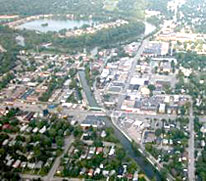
|
Broad Ripple Random Ripplings

The news from Broad Ripple
Brought to you by The Broad Ripple Gazette
(Delivering the news since 2004, every two weeks)

|
| Brought to you by: |

|

|

|

|

|

|
Converted from paper version of the Broad Ripple Gazette (v04n25)
Norris Thomas: World War II Veteran - part two - By Mario Morone
posted: Dec. 14, 2007
"I quietly eased myself upon the trail and quietly whispered if others were o.k. They whispered back. There was still no talking. The wire was repaired and we proceeded to the outpost. When we arrived, we slowly called out our password and quietly came the counter password. We continued on to the outpost, but didn't enter it. They wouldn't let us in because we stank too much. With communications reestablished, we quietly returned with the telephone wire in the repairman's hand. No other cuts were discovered. When we returned to the Company, the guys thought it was really funny. I didn't think it was funny, but now I do. We had to dump all our clothes, shoes, everything in our pockets and got all new issued clothing and equipment, except for our rifles. I will never forget that walk," Thomas noted.
"In Okinawa, the Japanese filed mortars. One of them exploded and a piece of coral flew off of a reef and hit Tenth Army commander (3-Star) Lieutenant General Simon B. Buckner, Jr. and killed him," he added. Major General Roy S. Geiger, Commanding General, III Amphibious Corps, took over command.
"When our division went into Japan at Nagasaki, you could see the destruction that the bomb did as most of the energy went up its valley. On the ground, you could see silhouettes of human forms burned into the roadway. We noticed a three-story building standing among the rubble close to the roadway as we walked about 10 miles to our military base (Kumomoto) of occupation. Some of us wanted to go inspect the building, but our captain told us not to break rank. A few days later, some of us returned to Nagaski where that concrete building was located. It had collapsed into a pile of rubble. We walked from Nagaski with full packs for about 10 miles to Kumomoto where we were stationed during our tour of duty in Japan. When leaving Kumomoto, we were taken to a seaport where we boarded a ship and sailed back to the U.S.," he said.
"I was discharged as a Corporal in San Diego from the USMC. They wanted me to re-enlist, but I though it was best not to. After completing high school, I enrolled in Oklahoma City University. Between school years in 1948, I visited a fellow Marine that I served with who was living in Indiana. I also planned to visit Arkansas and Tennessee before returning to college at Oklahoma City University. After arriving in Indianapolis, I was running out of money when I found a job. I stayed in Indianapolis because I liked the city and decided to transfer to Butler University on the GI Bill. While I was a Butler student, I met an attractive, young lady, Jackie, whom I later married. I worked at various jobs before getting hired at Citizens Gas & Coke Utility, initially as an accident and claims adjuster. I later became an assistant purchasing agent and then retired as a purchasing agent in 1984 after working there over 30 years," Thomas mentioned.
"Some people have asked me what military life was like. It was well regimented, as it needs to be. Some food was excellent, some was good, some was "C" rationed and some was canned. Personally, I lived a lot on chocolate "D" bars. I always had two in my pocket. Our supplies were always plentiful. Combat was stressful and I did a lot of praying, but you learned to live with it. We were sometimes entertained. At other times, some of us read, some gambled, played cards or watched movies when available and talked to each other. Sometimes, for fun, someone would short sheet someone's bed. Our officers were mostly excellent and relationships were very good. Each of us remembered we might have to go back into combat with them. Some kept diaries. I did not, but now I wish I did," Thomas surmised.
He emphasized, "The war left me with the feeling that freedom is not free. Only those willing to fight for it are free, otherwise, they are dominated. Freedom is not free. My years in military service also made me more aware of the value of our way of life, which I believe is a gift from God. My concern is 'What will happen to our nation?' History reveals that great nations do not last forever. What will follow ours? With that, I pray that all our lives will be as we have wanted them to be and as our desires and dreams have directed us," he concluded.
You can hear many fascinating stories of courageous veterans like Norris Thomas whom speak every month at the Knights of Columbus Council, just west of 71st and Keystone Avenue. They also have a Friday morning coffee klatch at the Home Place Library, located at 10801 North College Avenue. There is also a War Years Discussion Group that meets the fourth Thursday afternoon of every month at 1:30 p.m. at Home Place Library. Call 582-0507 for more information. Everyone is welcome to attend.
The World War II Round Table meets the fourth Monday of each month at the Knights of Columbus Council, located at 2100 East 71st Street. All U.S. veterans and history buffs are welcome to attend. Monthly speakers who have served from all branches of the military share their experiences. A buffet dinner begins at 5 p.m. for $8.00 per individual.
Part one appeared in Volume 4 Number 24.
- end of part two
mario@broadripplegazette.com

|

|

|
| Brought to you by: |

|

|

|
| Brought to you by: |

|

|

|


